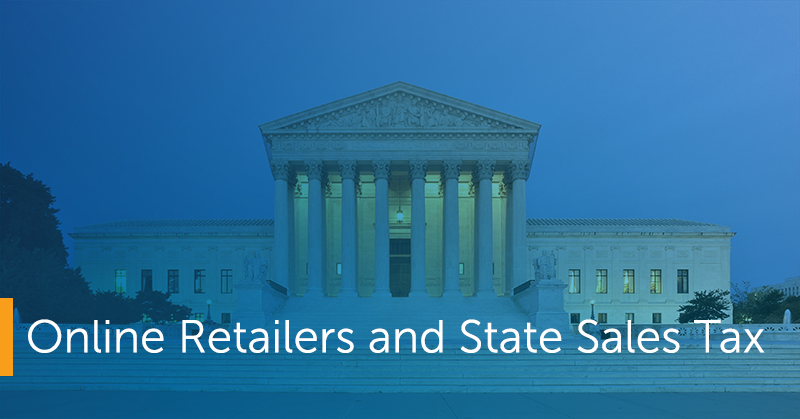-
Software
Compliance Software
Businesses and nonprofits can oversee licenses, track renewals, access documents, and more from a single interface.
Software OverviewSoftware Features -
Services
Compliance Services
Full service compliance solutions for organizations throughout their entire lifecycles.
Business Overview Nonprofit Overview -
Industries
Industry Services
Specialized licensing services for organizations in highly regulated industries.
General BusinessIndustries - Information Center
Online Retailers and State Sales Tax After South Dakota v. Wayfair
Posted on July 9, 2018 by Betsy Gonzalez in Business Compliance.

The recent U.S. Supreme Court decision in South Dakota v. Wayfair opens the door to significant expansions of state sales tax obligations for online retailers. In the wake of the decision, many interstate and online sellers may find that they need to register more widely for sales tax or apply for exemptions in new states. Our specialists can make the regulatory aspects seamless for you by filing sales tax registrations, exemptions, and renewals in any state. The following provides a quick summary of the changes and next steps for handling the regulatory aspects for businesses affected by the decision.
Background: The Decision
Previously, out-of-state sellers were subject to sales tax in states where they maintained a physical presence. The Supreme Court found that after governing interstate commerce for half a century, the physical presence rule was becoming “further removed from reality” each year and causing estimated revenue losses of $8 to $33 billion annually to states.1
In the absence of the physical presence rule, the decision leaves “substantial nexus” as a test for establishing state tax obligations, broadly defined under a prior ruling as “when the taxpayer [or collector] ‘avails itself of the substantial privilege of carrying on business’ in that jurisdiction.”2 This gives states much greater latitude to establish independent standards for sales tax nexus.
In light of the decision, interstate online sellers and Software as a Service (SaaS) companies should reevaluate their state sales tax obligations with guidance from accounting and legal teams.
What About Small Online Retailers?
The change could have a significant impact on small online businesses, a concern expressed by Chief Justice John Roberts in a dissenting opinion. States may address this by providing exemptions for smaller retailers, however. For example, the law that inspired South Dakota v. Wayfair provides an exemption for businesses with less than $100,000 in annual sales or fewer than 200 transactions within the state.
Where exemptions are provided, it’s important to note that businesses may nonetheless need to apply for exemption. The application process is generally similar to the tax registration process, often requiring annual renewals to maintain your exempt status.
Registration and Foreign Qualification
If you find that you must register more widely following South Dakota v. Wayfair, we can help you cut the government paperwork down to size. Commonly, a legal entity will need to exist in a state as a prerequisite to registering for tax. This process is called foreign qualification, and Harbor Compliance can handle that handle that process for you. We can also register your business for sales and use tax and file exemptions where eligible. When you work with us, you’ll have a dedicated team of specialists who will gather the required documents and information, prepare the applications, and follow up with state authorities to ensure that you’re fully registered. Our tax services also include registering for corporate income and privilege taxes and payroll taxes.
We can further help with regulatory tasks such as entity formations, annual reports, registered agent service, and business licensing. Our services include monitoring your status and handling periodic renewals to maintain good standing in every state where you’re registered. Simply give us a call at 1-888-995-5895 or get in touch with a specialist to get started.
Changes in state regulations can pose challenges for businesses of all sizes, but government paperwork shouldn’t be one of them. With Harbor Compliance managing your regulatory filings, you can leave the work and worry of state registrations to the specialists and turn your attention back to growing sales and earning customers at the speed and scale of modern commerce.
1. South Dakota v. Wayfair, Inc. et al.,585 U.S. ____ (2018). Slip Opinion. 21 June 2018. Web. https://www.supremecourt.gov/opinions/17pdf/17-494_j4el.pdf
2. Ibid.



